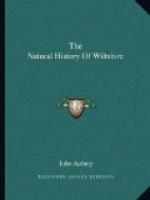___________________________________
There was, at the Abbey of Malmesbury, a very high
spire-steeple, as high almost, they at Malmesbury
say, as that of St. Paul’s, London; and they
further report, that when the steeple fell down the
ball of it fell as far as the Griffin Inne.
___________________________________
The top of the tower of Sutton Benger is very elegant, there is not such another in the county. It much resembles St Walborough’s [St. Werburg’s] at Bristoll. [The tower of Sutton Benger church, here alluded to, has a large open-work’d pinnacle, rising from the centre of the roof; a beautiful and very singular ornament. See the wood-cut in the title-page of the present volume.- J. B.]
The priory of Broadstock was very well built, and with good strong ribbs, as one may conclude by the remaines that are left of it yet standing, which are the cellar, which is strongly vaulted with freestone, and the hall above it. It is the stateliest cellar in Wiltshire. The Hall is spatious, and within that the priour’s parlour, wherein is good carving. In the middle of the south side of the hall is a large chimney, over which is a great window, so that the draught of the smoake runnes on each side of the chimney. Above the cellars the hall and parlours are one moietie; the church or, chapell stood on the south side of the hall, under which was a vault, as at St. Faithes under Paules. The very fundations of this fair church are now, 1666, digged up, where I saw severall freestone coffins, having two holes bored in the bottome, and severall capitalls and bases of handsome Gothique pillars. On the west end of the hall was the King’s lodgeings, which they say were very noble, and standing about 1588. [Aubrey records some further particulars of Bradenstoke Priory; a short account of which edifice will be found in the third volume of the Beauties of Wiltshire. The Gentleman’s Magazine, Nov. 1833, contains a wood-cut and account of this old religious house. See also Bowles’s History of Lacock Abbey.-J. B.]
The church of Broad Chalke was dedicated to All-Hallowes,
as appeares by the ancient parish booke. The
tradition is that it was built by a lawyer, whose
picture is in severall of the glasse-windowes yet
remaining, kneeling, in a purple gowne or robe, and
at the bottome of the windowes this subscription:
“Orate pro felici statu Magistri Sieardi Lenot”.
This church hath no pillar, and the breadth is thirty
and two feete and two inches. Hereabout are no
trees now growing that would be long enough to make
the crosse beames that doe reach from side to side.
By the fashion of the windowes I doe guesse that it
was built in the reigne of King Henry the Sixth. [The
church of Broad Chalk is described in Hoare’s
Modern Wiltshire, Hundred of Chalk, p. 148.]
___________________________________




